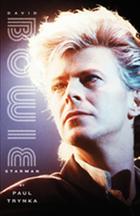
David Bowie: Starman by Paul Trynka (Little, Brown, $25.99 hardcover, 9780316032254 July 18, 2011)
 It seems fitting that the "real" David Bowie, long a master of chameleon-like ch-ch-changes, has remained an enigma despite a slew of biographies. While Paul Trynka's new book--unauthorized by Bowie and containing no new interviews with him--does not solve the mystery or provide anecdotes of the "never before revealed" variety, it does offer a very thoughtful and meticulously researched study of one of rock's few supernovas, as well as the era that produced him.
It seems fitting that the "real" David Bowie, long a master of chameleon-like ch-ch-changes, has remained an enigma despite a slew of biographies. While Paul Trynka's new book--unauthorized by Bowie and containing no new interviews with him--does not solve the mystery or provide anecdotes of the "never before revealed" variety, it does offer a very thoughtful and meticulously researched study of one of rock's few supernovas, as well as the era that produced him.
A former editor of MOJO magazine, Trynka's enthusiasm and passion for music is evident throughout Starman, which is more of a love letter to the work Bowie produced than to the man himself. As a result, much knowledgeable attention is devoted here to the particulars of songs, albums and production--a somewhat rare treat in rock bios, as ironic as that seems. Ever wondered how Robert Fripp achieved that beautiful and haunting guitar sound on "Heroes"? That's just one of the satisfying morsels that are packed like bonbons into this particular box of chocolates.
Which is not to say there aren't plenty of gossipy (albeit restrained) tidbits here as well. Trynka conducted more than 250 new interviews for this book, including Bowie's childhood friends and ex-wife (and Ziggy Stardust designer) Angie, and combines them here with previously published Bowie interviews, creating as intimate a portrait as possible of a man whose one consistency seemed to be an almost supernatural drive for success. Through a recounting of his early years (and many bands), Trynka offers evidence that, although capable, Bowie was not himself a particularly gifted musician. Rather, his brilliance was in extracting and combining the musical gifts of others. The famous Oscar Wilde quote, "Talent borrows, genius steals" might have been written for David Bowie, who stole the best and created out of it something wholly unique and fantastic.
Of course, in order for Bowie to succeed as he did, the timing had to be right as well. Trynka does a terrific job describing the scene in London, New York and Los Angeles in the 1970s; the acceptance of anything-goes debauchery, the celebration of cocaine as a high-class aide to creativity (rather than the highly addictive drug we now know it to be) and the inexorable shift of the music industry into big business.
Following a major heart attack and surgery in 2004, Bowie all but disappeared from public view. Trynka speculates on why but doesn't spend much time discussing this (nor much of what many fans consider Bowie's subpar post-Scary Monsters work). What he does do--admirably--with this fine biography is to foster a whole new appreciation of an artist who inspired countless others. --Debra Ginsberg
Shelf Talker: A thorough and thoughtful biography of superstar chameleon David Bowie, which also sheds light on the era in which he became famous.

